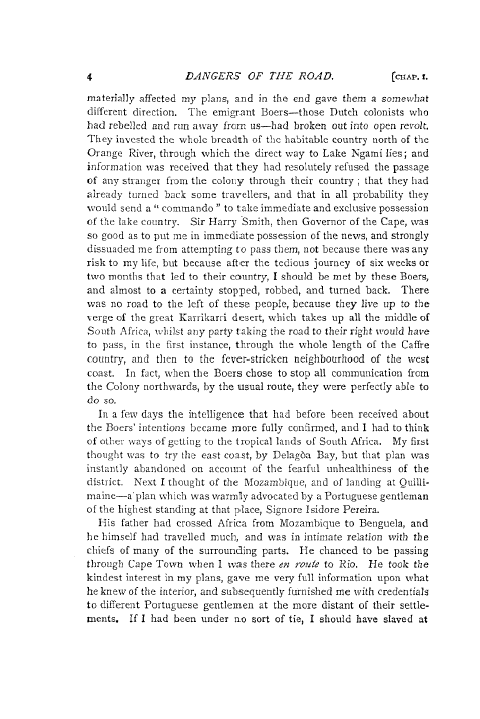4 DANGERS OF TIIE ROAD. (CHAP. t.
materially affected my plans, and in the end gave them a somewhat different direction. The emigrant Boers-those Dutch colonists who had rebelled and run away from us-had broken out into open revolt. They invested the whole breadth of the habitable country north of the Orange River, through which the direct way to Lake Ngami lies; and information was received that they had resolutely refused the passage of any stranger from the colony through their country ; that they had already turned back some travellers, and that in all probability they would send a " commando " to take immediate and exclusive possession of the lake country. Sir Harry Smith, then Governor of the Cape, was so good as to put me in immediate possession of the news, and strongly dissuaded me from attempting to pass them, not because there was any risk to my life, but because after the tedious journey of six weeks or two months that led to their country, I should be met by these Boers, and almost to a certainty stopped, robbed, and turned back. There was no road to the left of these people, because they live up to the verge of the great Karrikarri desert, which takes up all the middle of South Africa, whilst any party taking the road to their right would have to pass, in the first instance, through the whole length of the Caffre country, and then to the fever-stricken neighbourhood of the west coast. In fact, when the Boers chose to stop all communication from the Colony northwards, by the usual route, they were perfectly able to do so.
In a few days the intelligence that had before been received about the Boers' intentions became more fully confirmed, and I had to think of other ways of getting to the tropical lands of South Africa. My first thought was to try the east coast, by Delagba Bay, but that plan was instantly abandoned on account of the fearful unhealthiness of the district. Next I thought of the Mozambique, and of landing at Quillitnaine-a'plan which was warmly advocated by a Portuguese gentleman of the highest standing at that place, Signore Isidore Pereira.
His father had crossed Africa from Mozambique to Benguela, and he himself had travelled much, and was in intimate relation with the chiefs of many of the surrounding parts. He chanced to be passing through Cape Town when I was there en route to Rio. He took the kindest interest in my plans, gave me very full information upon what he knew of the interior, and subsequently furnished me with credentials to different Portuguese gentlemen at the more distant of their settlements. If I had been under no sort of tie, I should have slaved at

